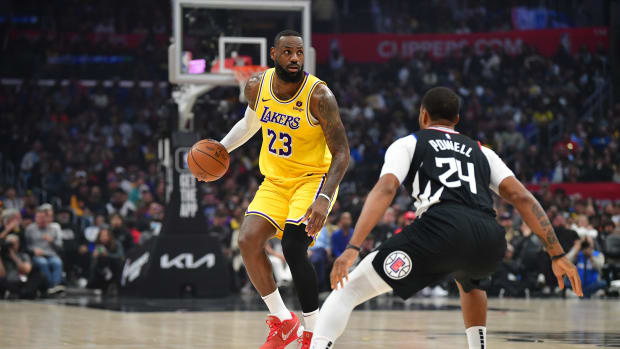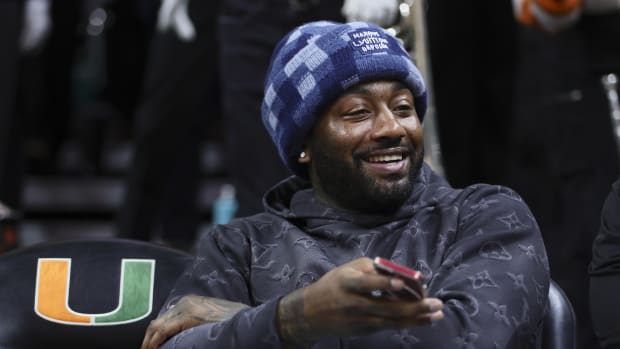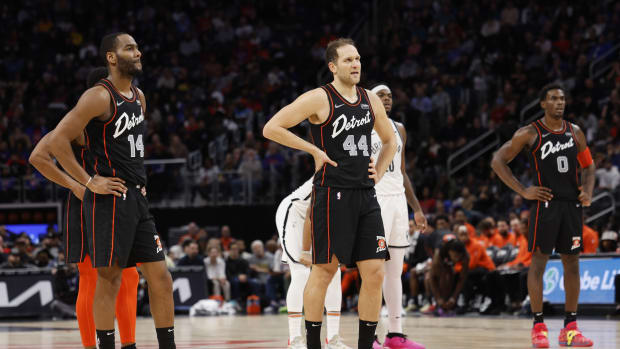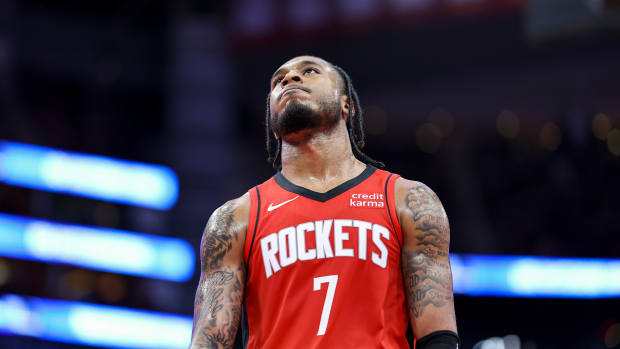Jerry Colangelo on Team USA Collapse: ‘This Will Bother Me Until the 2020 Olympics’
LOS ANGELES — Disappointing.
Embarrassing.
A reason for reevaluation.
Just a few of the words and phrases that flooded the internet in the aftermath of USA Basketball’s seventh-place finish at the FIBA World Cup. It was the U.S.’s worst finish in a major international tournament, slipping below the humiliating sixth-place Team USA picked up at the World Championships in 2002, widely viewed as rock bottom for the pro version of the U.S. squad.
So: Has Team USA hit a new low?
“You can’t compare the two years,” USA Basketball managing director Jerry Colangelo told SI.com. “It’s apples and oranges.”
It is. Of course it is. In 2002, the idea of playing for USA Basketball had lost all of its sizzle. The group that had signed on played selfishly, bricked an astonishing number of free throws and was led by a coach, George Karl, not known for his ability to unite a locker room.
It’s not USA fanboying to submit that this team was snakebitten. The World Cup is a big deal internationally. In the U.S., it barely registers. The timing was awful. This was the first World Cup held a year before the Olympics, according to Colangelo. A tournament that wraps two weeks before NBA training camps open? Top stars—especially ones with Olympic gold medals in their pockets—weren’t going for that.
Injuries happen. That’s what bothers Colangelo the most. Kyle Kuzma—one of the few snipers on the U.S. team—withdrew before the tournament with an ankle injury. Jayson Tatum, an elite wing scorer, sprained his ankle early in the tournament and didn’t play for the rest of it. “I believe that if we didn’t have those injuries, we would have won,” said Colangelo. “The injuries were just too much to absorb.”
And you know what? The rest of the world is good. France, which bounced the U.S. from the quarterfinals, is led by Rudy Gobert, a two-time Defensive Player of the Year. Evan Fournier averaged 15 points for Orlando last season. Frank Ntilikina was a lottery pick. Serbia, which handed the U.S. its second loss of the tournament, has Nikola Jokic and Bogdan Bogdanovic. Good players, complemented by a roster of guys who have spent years playing together.
“Basketball is the ultimate team game,” Colangelo said. “The more familiarity that players have with one another on the court, the better. Look at guys on Spain, Argentina. Luis Scola played [for Argentina]. He’s 39, played like he was 20. Manu Ginobili was there, he told [USA coach Gregg Popovich] that he was so proud of the Argentineans … you have to give credit to the rest of the world.”
So what’s the solution? A national team comprised of non-NBA players, like the one Jeff Van Gundy coached in the qualifier last fall? Unrealistic. Colangelo is clearly irritated by some of the withdrawals this summer. “The disappointment I feel is not from the guys who said they wouldn’t play,” Colangelo said. “It’s those that said they would, and then backed out.”
Still, Colangelo isn’t about to turn away talent. He hinted that he has had indications that some of the top players will return for the 2020 Olympics. He has a deep appreciation for the players that committed to play in the World Cup, suggesting that there were “2-3 players” who likely punched their tickets to Tokyo. Kemba Walker, Team USA’s leading scorer, is probably one. Donovan Mitchell, who singlehandedly kept the U.S. team in the game against France, is another. Colangelo also went out of his way to praise Marcus Smart, a defensive menace who can guard multiple positions.
And the late withdrawals, a list of talent that includes James Harden, Anthony Davis and Damian Lillard? If they want to play next summer? “We’ll deal with those cases individually,” Colangelo said. “It’s important to field as strong a team as possible.”
Indeed. When the U.S. suits up its A-Team, it’s unbeatable. In 2016, the U.S. routed Serbia in the gold medal game by 30. The average margin of victory in that Olympic cycle: 22.5 points. In 2020, the schedule is ideal; the Olympics open in late July and conclude in early August. The chance to be part of another Redeem Team should be motivating.
It is for Colangelo. Next summer will end his 14-year tenure at the helm of USA Basketball. He oversaw the recovery of Team USA in 2008. He’s hellbent on making sure he leaves with the team on top. “There has not been any disappointment around USA Basketball in a while,” said Colangelo. “This will bother me until the 2020 Olympics.”
This summer was disappointing. And there will be disappointment again. The U.S. might never lose another Olympics. But a World Cup, a tournament in between Olympic cycles? They will lose another of those, for sure. The world is too good for the U.S. to scotch tape a collection of good NBA players to a roster and expect to win. It’s not embarrassing or humiliating that Team USA lost—it’s a reality.
Send the best, and it’s a blowout.
Send anything less, and the struggles of this summer will be repeated.


































